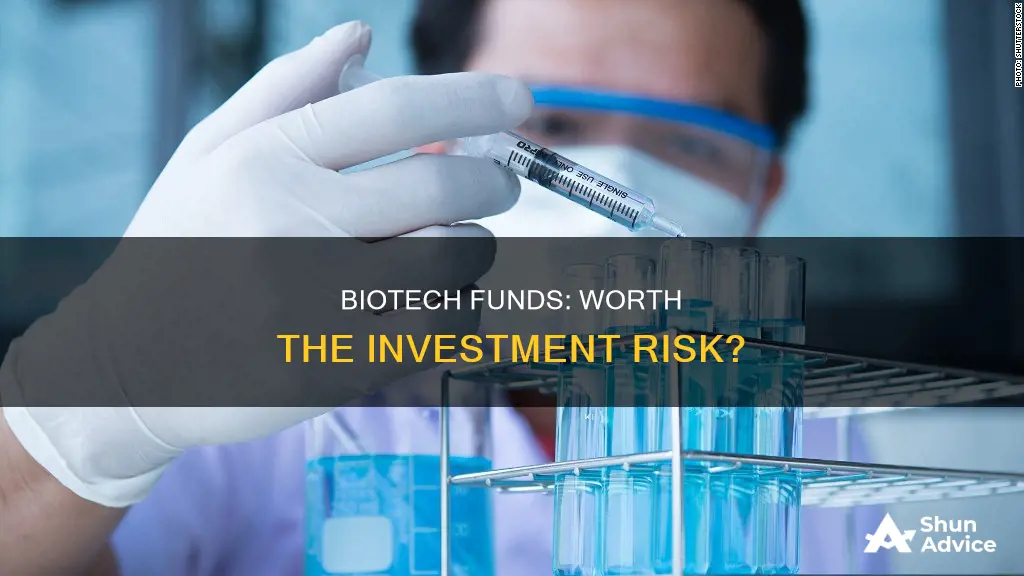
Investing in biotech funds is a risky but potentially rewarding endeavour. The biotech industry is at the forefront of scientific advancement, with the potential to generate substantial returns for investors. The industry has been booming in recent years, with revenue increasing elevenfold between 2000 and 2023. However, investing in biotech comes with high risks due to the lengthy and uncertain drug development process, strict regulations, and the possibility that products may never make it to market. Biotech stocks are highly volatile, and it is challenging to determine the chances of success for a drug, especially for investors without a medical background. Nonetheless, the potential for groundbreaking innovations in medicine makes biotech funds an attractive investment opportunity for those seeking high-risk, high-reward investments.
| Characteristics | Values |
|---|---|
| Potential returns | High |
| Risk | High |
| Nature of the industry | Cyclical, high-risk, high-reward |
| Companies in the sector | Ginkgo Bioworks Holdings Inc., Cara Therapeutics Inc., Agilent Technologies Inc., Amgen Inc., Vertex Pharmaceuticals Inc., Regeneron Pharmaceuticals Inc., Gilead Sciences Inc., Moderna Inc. |
| ETFs to invest in | VanEck Biotech ETF, iShares Biotechnology ETF, Invesco Nasdaq Biotechnology ETF, SPDR S&P Biotech ETF, Global X Genomics & Biotechnology ETF, WisdomTree BioRevolution Fund, Direxion Daily S&P Biotech Bull 3x Shares |
What You'll Learn

What are biotech funds?
Biotech funds, also known as biotech exchange-traded funds (ETFs), are a way to invest in the biotechnology industry without picking individual stocks. ETFs are baskets of securities that trade on an exchange like a stock and are a popular investment vehicle because they offer diversification, which can help mitigate risk.
The biotech industry is centred on using living organisms and bioprocesses for innovative drug development, genetic research, and advanced medical diagnostics. It is a high-risk, high-reward industry where small single-product companies can become worth hundreds of millions practically overnight if a breakthrough occurs. However, it is also subject to volatile swings in the opposite direction if a product under development fails to make it to market or passes clinical trials.
Biotech ETFs provide exposure to a basket of biotech stocks, reducing the risk of investing in any one company. Examples of biotech ETFs include:
- VanEck Biotech ETF (BBH)
- IShares Biotechnology ETF (IBB)
- Invesco Nasdaq Biotechnology ETF (IBBQ)
- SPDR S&P Biotech ETF (XBI)
- Global X Genomics & Biotechnology ETF (GNOM)
- WisdomTree BioRevolution Fund (WDNA)
Biotech ETFs can be a good choice for investors who want exposure to the biotech industry but want to reduce the risk of picking individual stocks.
Vanguard Bond Fund: A Smart Investment Decision
You may want to see also

What are the risks of investing in biotech?
Investing in biotech stocks is an exciting opportunity to capitalise on cutting-edge innovations in medicine. However, it is a risky endeavour due to the lengthy and uncertain nature of drug development and the strict regulations surrounding the industry.
Biotech firms use living organisms to manufacture products, which sets them apart from pharmaceutical companies that typically use chemicals to develop drugs. This means that, in addition to the usual risks associated with investing in the healthcare industry, there are further complexities and challenges when investing in biotech.
One of the biggest risks is the potential for products under development to never make it to market. The process of drug development is long and arduous, with the average drug taking around 12 years to go from concept to creation. It involves figuring out the science, conducting clinical trials, and seeking approval from regulatory bodies like the Food and Drug Administration (FDA). This process is fraught with uncertainty, and even analysts at financial institutions can struggle to predict the performance of biotech companies accurately.
Furthermore, the complexity of biotechnology can make it challenging for investors, especially those without a medical or scientific background, to determine a product's effectiveness and chances of success. This means that investors may need to conduct extensive research or consult with experts before making investment decisions.
Another risk to consider is the impact of news releases and announcements regarding clinical trials and regulatory approvals. Since biotech companies often have a small number of products, these announcements can significantly impact the direction of the company's stock. Positive news can cause a surge in stock prices, while negative news can lead to a sharp decline.
In addition, biotech companies need to preserve capital for research and development during slow periods, which may involve downsizing and restructuring. This can create uncertainty for investors, especially if there are no approved products on the market generating revenue.
Finally, the high risk of failure in the biotech industry means that picking individual stocks to invest in can be very difficult and risky. A more cautious approach may be to invest in the entire industry using a biotech exchange-traded fund (ETF) that provides diversification and mitigates the risk of picking individual companies.
Paying Interest to Investors: A Guide to Investment Fund Strategies
You may want to see also

What are the potential rewards of investing in biotech?
Investing in biotech can be incredibly rewarding, with the potential for significant financial gains. The biotech industry is at the forefront of scientific advancement, with the potential to develop revolutionary products that can transform lives and generate substantial returns for investors.
Biotech firms are often at the cutting edge of innovation, working on treatments and cures for some of the world's most challenging diseases and conditions. For example, some biotech companies are working on bacteria-based cancer cures, stem cell blindness treatments, and lab-grown meat. These innovations can not only improve the lives of those suffering from these conditions but also have wider societal benefits, such as reducing the economic burden of costly diseases.
Biotech is also a rapidly growing industry, with the total revenue of biotech companies in the Nasdaq Biotechnology Index increasing eleven-fold between 2000 and 2023. This growth is expected to continue, with an annual rate of almost 10% predicted over the next two years. This expansion means that biotech is an attractive investment opportunity, with the potential for high returns.
Additionally, biotech firms often have longer patent protection than traditional pharmaceutical companies, with 12 years of protection compared to five. This extended patent protection provides biotech companies with a competitive advantage and the potential for greater profits.
Furthermore, biotech firms are often attractive acquisition targets for larger biopharma companies. Smaller biotech firms with promising technologies or treatments may be acquired by larger companies, providing investors with the potential for significant returns.
However, investing in biotech also comes with risks. It is a complex and highly regulated industry, and it can be challenging to determine the effectiveness and success chances of a product. The development process can be lengthy and costly, and there is no guarantee that a product will make it to market. Therefore, investing in biotech requires a thorough understanding of the industry, the companies, and the potential risks and rewards.
Index Funds: Why Don't More People Invest?
You may want to see also

How do I analyse and pick biotech stocks?
Analysing and picking biotech stocks is a complex and challenging task due to the inherent complexity and uncertainty of the biotechnology business. Here are some key considerations for those looking to venture into this field:
- Product and Pipeline: A biotech company's product and research pipeline are critical to its success. Look for companies developing multiple treatments rather than a single one. Also, consider the diseases and conditions the company's products target. Ideally, these should be areas with large patient populations and high potential returns on investment, such as cancer, cardiovascular diseases, and central nervous system disorders.
- Stage of Development: The later the stage of clinical development, the greater the chances of regulatory approval, market launch, and commercial success. However, investing later in the process may result in smaller gains as other investors push up demand and share prices.
- Patents and Intellectual Property: Patents protect a company's technology and increase its value. They also attract commercial partners who can fund research, development, and marketing.
- Research and Development (R&D): Evaluate the company's R&D spending and track record. In 2019, large-cap biotech companies spent about 24% of revenue on R&D, while small-cap companies spent more than five times their revenue. Look for companies focused on developing cost-effective drugs and breakthrough therapies rather than those delivering similar results to existing treatments.
- Management and Talent: The talent and experience of management are critical for long-term success. Ideally, look for companies led by executives with a successful track record of developing and commercialising treatments.
- Partnerships and Collaborations: Biotech companies rarely succeed alone due to the high costs of drug development. Seek out companies with promising collaborations and licensing partnerships that demonstrate lasting commitment and include favourable deal terms, such as royalty rates, upfront payments, and milestone payments.
- Financial Position: Examine the company's cash position and funding sources. A strong balance sheet indicates the ability to continue investing in R&D and negotiating favourable partnerships. Evaluate the company's ability to generate cash and manage debt.
- Industry and Macroeconomic Factors: Understand the industry in which the company operates and the external economic conditions that can impact its performance, such as inflation and interest rates. Evaluate the growth potential and future challenges of the industry, including technological advancements, regulatory changes, and shifts in consumer behaviour.
- Company Fundamentals: Assess the company's business model, strengths, weaknesses, revenue streams, and financial statements (balance sheet, profit and loss statement, and cash flow statement).
- Risk Analysis: Consider the risks associated with investing in biotech stocks, including the impact of government policy changes, fundamental changes in the company, and the entry of new competitors.
- Stock Analysis: Compare the stock's performance with its peers over specific timeframes. Evaluate the company's competitive edge, upcoming projects, price-to-earnings (PE) ratio, dividend yields, and growth prospects.
A Secure Guide to Insurance Fund Investment
You may want to see also

What are the alternatives to investing in individual biotech companies?
Investing in biotech stocks is exciting, with the potential to capitalise on cutting-edge innovations in medicine. However, it is a risky and complicated business. Here are some alternative ways to invest in the biotech industry without buying individual stocks:
Exchange-traded funds (ETFs)
ETFs are a good way to invest in biotech without the risk of picking individual stocks. ETFs are baskets of stocks that trade on an exchange like a single stock. There are several dozen biotech ETFs on the market, some focused on large-cap companies and others on small, early-stage companies.
Real estate investment
Biotech firms need expensive lab space. Investing in real estate investment trusts (REITs) that own lab space is another way to gain exposure to the biotech industry. For example, Alexandria Real Estate Equities owns a lot of lab space in innovation hotspots like California and Massachusetts.
Contract Development and Manufacturing Organisations (CDMOs)
CDMOs are companies that manufacture drugs once the research is complete. CDMO services are in high demand because drug manufacturing is too expensive and difficult for most biotech firms to do themselves. Lonza and Catalent are the biggest players in this market, but it is currently fragmented, so there could be big paydays for investors if there is increased acquisition activity.
Biotech funds
Biotech funds are managed by specialist professional investors. You will have to pay for their expertise, but they may be better able to pick winners in this complicated industry.
Angel investing and crowdfunding
If you are willing to take a big risk, you can consider angel investing and equity crowdfunding. These are very early-stage investments in biotech companies that could result in massive gains, but the risks are huge.
Private Investment in Public Equity (PIPE)
PIPE is a private placement of securities of an already-public company that is made to selected accredited investors. PIPE transactions may involve the sale of common stock, convertible preferred stock, convertible debentures, warrants, or other equity or equity-like securities of an already-public company. They have lower transaction expenses and require less disclosure than traditional IPOs.
At-the-Market (ATM) facilities
ATM offerings are more flexible and cheaper than traditional secondary stock offerings. They allow companies to raise money by leveraging company milestones, news releases, upward trends in share price or a broader bull market. ATM offerings tend to be smaller and more spaced out than traditional offerings, and companies are not obligated to sell if prices are unfavourable. However, they are vulnerable to price volatility.
Equity line of credit
An equity line of credit allows a company to raise equity capital as needed over a period of time, usually 2-3 years. The company commits to purchasing up to a pre-established dollar amount of the company's shares, and the purchaser pays the market price less an agreed-upon discount.
A Guide to Investing in Birla Sunlife Mutual Funds
You may want to see also
Frequently asked questions
The biotech industry is centred on using living organisms and bioprocesses for innovative drug development, genetic research, and advanced medical diagnostics.
The biotech industry is high-risk and high-reward. There is a high risk of failure for biotech companies as innovations must undergo years of clinical trials, and a single failure can destroy the equity of a company.
The biotech industry has the potential to provide investors with incredible returns. The long-term returns of biotech have outperformed other sectors, including pharmaceuticals and tech, in both venture capital and public markets.
You can invest in biotech funds through exchange-traded funds (ETFs) or by purchasing individual stocks. It is recommended that investors use the diversification inherent in an ETF to invest in the biotech space due to the high risk involved.
Some specific biotech funds you can consider include the VanEck Biotech ETF (BBH), iShares Biotechnology ETF (IBB), and Invesco Nasdaq Biotechnology ETF (IBBQ). Some individual biotech stocks to consider include Intellia Therapeutics, Crispr Therapeutics, and Royalty Pharma.







